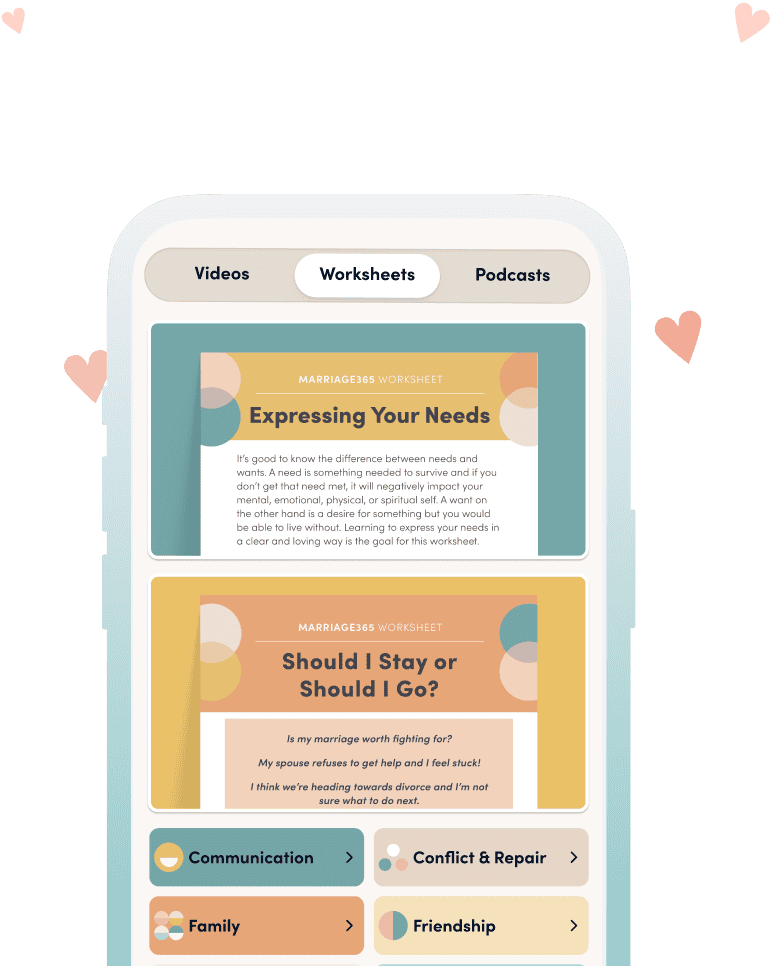This probably doesn’t come as a surprise based on the nature of what we do here at Marriage365, but we get a lot of messages about marital conflict.
Message after message, I see couples at odds with each other over this situation or that situation and at the root of most of these disagreements, what I see, is a lack of emotional intelligence. Unfortunately, “emotional intelligence” is not a buzz word in our society and is not often taught to our youth, which means many adults do not harbor this important trait.
Thankfully, emotional intelligence is something that can be learned (if you are intentional about it). With that said, I thought it would be very helpful to share habits of emotionally intelligent individuals so that you can see where you are at.
First, though, I went old school and “dictionary.com-ed” the definition of emotional intelligence so that we can all be on the same page about what it is:
EMOTIONAL INTELLIGENCE: the capacity to be aware of, control, and express one’s emotions, and to handle interpersonal relationships judiciously and empathetically.
Now, here are 10 traits of an emotionally intelligent person:
Emotionally intelligent people are self-aware.
If you are emotionally intelligent, you practice skills that build your understanding of yourself – you know your strengths and weaknesses, you understand your triggers and you know what you need from others and from yourself. This also means you journal regularly to get all your thoughts out and sort through them in a healthy way.
Stop Scrolling!
It's time for healing
Marriage365 Membership is the #1 online resource trusted by over 100K couples to find, hope, healing, and connection. Let go of the pain for good.
Emotionally intelligent people own their feelings.
Once you know how you feel, you own it. You don’t pretend you’re okay when you’re not, you don’t lie or make excuses or minimize what’s going on. You own how you feel with confidence and security.
Emotionally intelligent people apologize for their mistakes.
Being emotionally intelligent means that you are able to recognize when you’ve hurt someone else and then offer up a sincere 4-step apology. And not only do you apologize, but you actually follow through with making effort to change your behavior. Need help on apologizing? We have a video for you to watch at Marriage365!
Emotionally intelligent people forgive and let go.
Being emotionally intelligent also means that you are able to forgive others for hurting you by recognizing that forgiving others is choosing not to harbor emotions that are harmful to you like bitterness and anger. In extreme cases, like with trauma and abuse, emotionally intelligent people seek the help of a professional counselor to work through their pain in a safe and trusted environment.
Emotionally intelligent people set boundaries.
A big part of emotional intelligence is knowing when to set boundaries as a hedge of protection around yourself and your family; it’s being able to recognize that someone or something is consistently harmful and doesn’t plan on changing any time soon.
Emotionally intelligent people communicate effectively.
Emotionally intelligent people put a lot of effort into learning and practicing effective communication. They wait until they are in a positive mental state before choosing to start challenging / hard / painful conversations and they make effort to speak the truth in love. If you’re emotionally intelligent, you’re most likely able to pick up others’ verbal and non-verbal gestures and habits as they communicate.
Emotionally intelligent people listen effectively.
They also know how to listen effectively. This means that they clarify to be absolutely certain they understand what the other person is trying to say before formulating a response. This means listening to understand, not to be understood.
Emotionally intelligent people are empathetic.
They know how to create a safe environment for the other person to be “messy” by putting aside their own perspective or understanding and try to look at any given situation from the other person’s point of view. Furthermore, they are able to validate the other person’s feelings, even if they don’t understand or agree.
Emotionally intelligent people ask open-ended questions.
Emotionally intelligent people know that the best way to connect with others is to ask open-ended questions and allow the other person to open up. They spend a lot of time learning about others, instead of only talking about themselves. The best part of asking open-ended questions is that it gives you many opportunities to learn new things about the people in your life that you care about.
Emotionally intelligent people set realistic goals & expectations.
Someone who is emotionally intelligent recognizes that their goals and expectations need to be realistic to keep themselves on level ground; they don’t spend all day up in the clouds and they don’t resort to pessimism or self-defeating thoughts. They look at the options in front of them and plan for what they can realistically manage at the time, and are flexible and open to change.
After reading this, where would you rate yourself on a scale of 1-10 when it comes to emotional intelligence? Are there any of these habits that you could be working on? Are you excelling with any particular habit and if so, why do you think that is? If you realized that you have a lot of work to do, don’t panic! We have tons of resources and a staff full of people who would love to help you take steps in the right direction!
Written by Anna Collins
Anna Collins lives in northern California with her husband and two children. She is passionate about her marriage, staying at home with her kids, writing, coffee, good conversation, and game night. Her life dream is to someday write a book and see it published.








